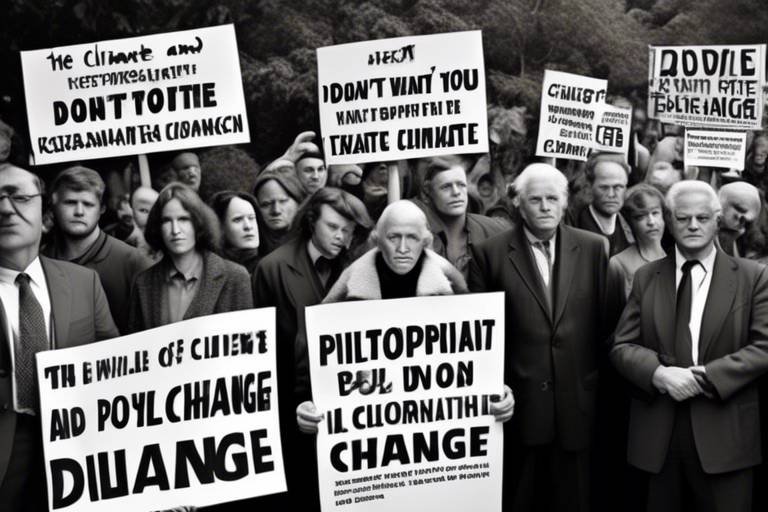Unraveling the Politics of Environmental Philosophy
Welcome to the fascinating world where environmental philosophy meets the intricate web of politics. This relationship is not just a casual acquaintance; it’s a complex dance that shapes how we view our responsibilities toward the planet. Have you ever wondered how philosophical ideas influence the laws that govern our environment? Or how ethical considerations play a role in ecological decision-making? These questions are at the heart of our exploration. In a world where climate change and environmental degradation are hot topics, understanding this interplay becomes crucial. It’s not just about saving the trees or protecting endangered species; it’s about redefining our relationship with nature and recognizing our place within it.
At its core, environmental philosophy challenges us to rethink our values and priorities. It pushes us to consider not only the immediate benefits of our actions but also the long-term consequences. Imagine standing at a crossroads: one path leads to short-term gains, while the other beckons with the promise of sustainability and harmony with nature. Which would you choose? This article aims to illuminate these paths, providing insights into how philosophical thought can guide us toward better environmental policies.
As we delve deeper, we'll encounter various thinkers who have laid the groundwork for this field. From Aldo Leopold's land ethic, which emphasizes the moral responsibility humans have to the natural world, to Arne Naess's deep ecology, which calls for a radical rethinking of our values, these ideas are not just academic musings; they are powerful tools that can drive change. They challenge us to consider questions like: What is the value of a forest? Is it merely a resource for timber, or does it hold intrinsic value that transcends human use? These philosophical inquiries are essential as we navigate the complexities of environmental governance.
But it’s not just about the philosophers; political theories also play a significant role in shaping environmental thought. The principles of utilitarianism, for example, advocate for actions that maximize overall happiness, but what happens when the environment is sacrificed for short-term benefits? This is where the conversation gets interesting and complicated. As we explore these themes, we’ll uncover how various political ideologies inform our understanding of environmental issues, leading to a richer, more nuanced perspective on the challenges we face.
So, buckle up as we embark on this journey through the politics of environmental philosophy. Together, we’ll unravel the threads that connect ethical considerations, political theories, and real-world implications, ultimately aiming to foster a deeper appreciation for the delicate balance between humanity and nature. Are you ready to dive in?
- What is environmental philosophy?
Environmental philosophy is a branch of philosophy that examines the ethical relationship between humans and the environment, exploring concepts like intrinsic value, sustainability, and our moral obligations to nature. - How do political theories influence environmental policies?
Political theories provide frameworks for understanding how decisions are made regarding environmental issues. For instance, utilitarianism focuses on maximizing overall good, which can lead to policies that prioritize economic growth over ecological health. - What is deep ecology?
Deep ecology is a philosophical perspective that advocates for the intrinsic value of all living beings, emphasizing the need for a radical change in how we perceive and interact with the natural world. - Why is environmental justice important?
Environmental justice highlights the need for equitable distribution of environmental benefits and burdens, ensuring that marginalized communities have a voice in environmental decision-making processes.

The Foundations of Environmental Philosophy
Environmental philosophy is a rich tapestry woven from various threads of thought, ethics, and a deep understanding of our relationship with nature. At its core, it seeks to answer fundamental questions about how we ought to treat the environment and what moral obligations we have towards other living beings. This philosophical discipline is not just an academic exercise; it influences real-world decisions, policies, and our everyday interactions with the world around us.
One of the pivotal figures in environmental philosophy is Henry David Thoreau, whose reflections on nature in his seminal work, Walden, continue to inspire eco-consciousness. Thoreau championed the idea of living simply and in harmony with nature, advocating for a lifestyle that respects the natural world rather than exploits it. His thoughts laid the groundwork for later environmental movements, emphasizing the intrinsic value of nature beyond its utility to humans.
Another influential thinker is Rachel Carson, whose book Silent Spring sparked widespread awareness about the dangers of pesticides and their impact on ecosystems. Carson’s work highlighted the interconnectedness of life, urging society to reconsider its approach to environmental stewardship. She brought to light the ethical implications of human actions on the environment, ultimately advocating for a more responsible and sustainable interaction with nature.
Furthermore, the philosophical discourse around environmental ethics has been enriched by the contributions of Arne Naess, who introduced the concept of deep ecology. This perspective argues for the inherent worth of all living beings, suggesting that nature should not merely be viewed as a resource for human use. Instead, deep ecology promotes a radical shift in how we perceive our place in the ecosystem, advocating for a holistic approach that values biodiversity and ecological balance.
These foundational ideas are critical as they shape the ethical frameworks that inform environmental policies. For instance, the principles derived from these philosophies can be seen in contemporary debates about climate change, conservation efforts, and sustainable development. By understanding the philosophical underpinnings of our environmental responsibilities, we can better navigate the complexities of ecological decision-making.
In summary, the foundations of environmental philosophy are built upon the insights of key thinkers who have profoundly influenced our understanding of nature and ethics. Their ideas compel us to reflect on our responsibilities and challenge us to foster a more sustainable relationship with the planet. As we continue to confront environmental crises, these philosophical frameworks will be essential in guiding our actions and policies toward a more equitable and resilient future.
- What is environmental philosophy? Environmental philosophy is a branch of philosophy that explores the ethical relationship between humans and the environment, addressing questions about how we should interact with nature.
- Who are some key figures in environmental philosophy? Notable figures include Henry David Thoreau, Rachel Carson, and Arne Naess, each contributing unique perspectives on our relationship with the natural world.
- How does environmental philosophy influence policy? The principles derived from environmental philosophy inform ethical decision-making and guide policies aimed at promoting sustainability and ecological integrity.
- What is deep ecology? Deep ecology is a philosophical approach that advocates for the intrinsic value of all living beings, emphasizing a holistic view of nature and the interconnectedness of life.

Political Theories Influencing Environmental Thought
When we dive into the world of environmental philosophy, it's impossible to ignore the profound impact of various political theories on how we perceive and address ecological issues. Different schools of thought not only shape our understanding of nature but also dictate the policies that govern our interactions with the environment. From the pragmatic approaches of utilitarianism to the radical perspectives offered by deep ecology, these theories provide a framework for evaluating our ethical responsibilities towards the planet. So, what exactly do these theories entail, and how do they influence our environmental policies?
One of the most significant political theories is utilitarianism, which suggests that the best action is the one that maximizes overall happiness or utility. In environmental discussions, this translates into policies that aim to achieve the greatest good for the greatest number of people. However, this approach can sometimes lead to a troubling oversight: the potential long-term consequences of actions that prioritize short-term gains. For instance, a policy that promotes extensive logging might create immediate economic benefits but could devastate ecosystems in the long run. This dilemma illustrates the tension between immediate human interests and the broader health of our environment.
On the other hand, deep ecology challenges the anthropocentric view inherent in utilitarianism. It posits that all living beings have intrinsic value, regardless of their utility to humans. This radical perspective has inspired numerous environmental movements that advocate for a more holistic approach to ecological preservation. Deep ecology urges us to rethink our relationship with nature, promoting policies that respect the rights of all living entities. Think of it as a call to arms for those who believe that the health of our planet should not be measured solely by human benefit.
A fascinating intersection arises when we consider how these political theories inform public discourse. For example, the debate surrounding climate change often sees utilitarian arguments clashing with deep ecological principles. Advocates of utilitarianism may argue for policies that mitigate climate change based on economic benefits, while deep ecologists might emphasize the moral imperative of preserving ecosystems for their own sake. This ongoing dialogue reflects the complexity of environmental decision-making and the necessity of integrating diverse philosophical perspectives.
Moreover, other political theories, such as socialism and libertarianism, also contribute to the environmental conversation. Socialism often emphasizes collective ownership and equitable resource distribution, which can lead to policies that prioritize sustainability and environmental justice. In contrast, libertarianism champions individual rights and minimal government intervention, which can complicate efforts to implement environmental regulations. Understanding these competing ideologies is crucial for crafting effective environmental policies that resonate with a broad spectrum of values.
In summary, the relationship between political theories and environmental thought is intricate and multifaceted. Each theory offers unique insights and challenges that influence how we approach ecological issues. As we navigate the complexities of environmental policy-making, it becomes increasingly important to consider these philosophical underpinnings. By doing so, we can foster a more inclusive dialogue that respects both human interests and the intrinsic value of the natural world.
- What is the main idea behind utilitarianism in environmental policy?
Utilitarianism focuses on maximizing overall happiness, often leading to policies that prioritize short-term economic benefits while potentially overlooking long-term ecological impacts. - How does deep ecology differ from traditional environmentalism?
Deep ecology advocates for the intrinsic value of all living beings, promoting a more radical approach to environmental preservation compared to traditional views that often prioritize human benefits. - Can different political theories coexist in environmental policy-making?
Yes, integrating various political theories can lead to more comprehensive and effective environmental policies that address a wider range of ethical and practical concerns.

Utilitarianism and Environmental Decision-Making
Utilitarianism, a philosophical theory rooted in the principle of maximizing overall happiness, plays a critical role in shaping environmental decision-making. At its core, this approach evaluates actions based on their consequences, aiming for the greatest good for the greatest number. But how does this translate into the complex realm of environmental policies? Well, it often leads to a balancing act where policymakers weigh the benefits of economic growth against potential ecological damage. For instance, when a government considers whether to allow a new industrial project, it must assess not only the economic benefits—like job creation and increased revenue—but also the environmental costs, such as pollution and habitat destruction.
In practice, utilitarianism can guide decisions in various ways. For example, when evaluating a proposed dam, decision-makers might consider:
- The energy production and its contribution to community welfare.
- The displacement of local populations and the loss of biodiversity.
- The long-term ecological impacts versus short-term economic gains.
This approach isn't without its challenges. Critics argue that utilitarianism often oversimplifies complex environmental issues, reducing them to mere calculations of costs and benefits. This can lead to decisions that favor short-term gains over long-term sustainability. Moreover, it tends to overlook the intrinsic value of nature, treating it merely as a resource for human use. This raises a crucial question: can we truly measure the worth of an ecosystem in terms of utility alone?
To illustrate the practical implications of utilitarianism in environmental decision-making, let’s take a look at a few case studies:
| Case Study | Description | Outcome |
|---|---|---|
| Hydraulic Fracturing (Fracking) | Economic benefits from natural gas extraction versus potential water contamination and air pollution. | Short-term economic growth but long-term environmental degradation. |
| Deforestation for Agriculture | Increased food production versus loss of biodiversity and carbon sinks. | Immediate food supply benefits but exacerbated climate change effects. |
| Renewable Energy Projects | Investment in solar or wind energy versus land use and wildlife impact. | Long-term sustainability benefits outweigh initial ecological costs. |
These examples highlight the tension inherent in utilitarian decision-making. While it can lead to beneficial outcomes, it often requires a nuanced understanding of environmental impacts, which can be difficult to quantify. As we navigate these complex waters, it becomes evident that relying solely on utilitarian principles may not suffice. Instead, a more holistic approach that incorporates ethical considerations, ecological integrity, and long-term sustainability is essential for effective environmental governance.
In conclusion, while utilitarianism provides a framework for evaluating environmental decisions, its limitations necessitate a broader perspective that acknowledges the intricate interdependencies of ecological systems. As we strive for a sustainable future, it’s crucial to ask ourselves: how can we ensure that our decisions not only benefit the present but also safeguard the environment for generations to come?

Case Studies in Utilitarian Approaches
When we delve into the realm of utilitarianism in environmental decision-making, it's essential to examine real-world examples that illustrate its application. These case studies reveal the complexities and nuances of applying utilitarian principles to ecological issues, often leading to surprising outcomes. One notable instance is the management of the California water crisis. Here, policymakers faced a dilemma: should they prioritize agricultural needs, which support the economy and jobs, or protect the dwindling water supply that sustains local ecosystems? The utilitarian approach, focusing on the greatest good for the greatest number, led to decisions that favored agricultural interests. However, this often came at the cost of long-term ecological health, raising questions about whether short-term benefits truly outweigh the broader implications of environmental degradation.
Another compelling example can be found in the Great Barrier Reef conservation efforts. In this case, the Australian government implemented policies aimed at maximizing tourism revenue while attempting to protect coral ecosystems. The rationale was straightforward: by promoting tourism, they could generate funds to support conservation initiatives. However, this utilitarian calculus failed to account for the ecological stress caused by increased human activity, leading to significant coral bleaching events. Here, the utilitarian principle of maximizing economic benefit clashed with the intrinsic value of preserving natural habitats, illustrating the limitations of a strictly utilitarian framework.
Furthermore, we can consider the role of renewable energy projects as another case study. When wind farms are constructed, the immediate benefits often include reduced carbon emissions and job creation. However, the utilitarian approach must also assess the impacts on local wildlife and ecosystems. For instance, the installation of wind turbines has been shown to affect bird migration patterns, leading to fatalities among certain species. This situation raises a critical question: can we truly claim to be acting in the best interest of the environment if our solutions create new problems? The utilitarian perspective can sometimes overlook these long-term ecological consequences, revealing a critical flaw in its application.
To further illustrate these points, the table below summarizes key case studies in utilitarian approaches to environmental decision-making:
| Case Study | Utilitarian Focus | Outcome | Critique |
|---|---|---|---|
| California Water Crisis | Agricultural Needs vs. Ecosystem Protection | Prioritized agriculture, leading to water shortages | Short-term gains vs. long-term ecological health |
| Great Barrier Reef | Tourism Revenue vs. Coral Conservation | Increased tourism but significant coral bleaching | Economic benefits overshadowed ecological impacts |
| Renewable Energy Projects | Job Creation vs. Wildlife Impact | Reduced emissions but harm to bird populations | New problems created by 'solutions' |
These case studies highlight the importance of a more nuanced approach to environmental decision-making. While utilitarianism offers a framework for evaluating the consequences of actions, it often falls short in addressing the complex interdependencies within ecosystems. As we move forward, it is crucial to integrate a broader range of philosophical perspectives that consider not just the immediate benefits but also the long-term health of our planet.
- What is utilitarianism? Utilitarianism is a philosophical theory that suggests actions are right if they promote the greatest happiness for the greatest number.
- How does utilitarianism apply to environmental issues? Utilitarianism can guide decision-making by weighing the benefits and harms of environmental policies, focusing on maximizing overall well-being.
- What are the limitations of utilitarianism in ecology? Utilitarianism can overlook long-term ecological consequences and the intrinsic value of nature, leading to decisions that may be harmful in the long run.
- Can you provide an example of utilitarianism in action? Yes, the California water crisis is a prime example where agricultural needs were prioritized, leading to significant ecological impacts.

Critiques of Utilitarianism in Ecology
Utilitarianism, while a popular framework in ethical decision-making, faces significant critiques when applied to ecological contexts. At its core, utilitarianism seeks to maximize overall happiness and minimize suffering. However, this principle can lead to some troubling implications for environmental ethics. One major critique is that it often prioritizes short-term benefits over long-term ecological health. For instance, a policy that promotes logging in a forest may provide immediate economic gains for a community, but it can result in long-lasting damage to biodiversity and ecosystem stability.
Another point of contention is the tendency of utilitarianism to commodify nature. By evaluating the environment solely in terms of its utility to humans, important aspects of ecological integrity can be overlooked. This perspective can lead to a dangerous mindset where nature is seen merely as a resource to be exploited rather than a complex system deserving of respect and preservation. Critics argue that such an approach diminishes the intrinsic value of ecosystems, which are vital for maintaining the balance of life on Earth.
Moreover, utilitarianism can struggle with the concept of intergenerational equity. Decisions made today can have profound impacts on future generations, yet utilitarian calculations often focus on the present population's happiness. This raises ethical questions about our responsibility to future inhabitants of the planet. For example, policies that favor fossil fuel extraction might satisfy current demands for energy but could leave future generations facing severe climate consequences.
In addition to these critiques, there is a growing concern about the marginalization of minority voices in utilitarian calculations. Often, the interests of marginalized communities or endangered species are sidelined in favor of the majority's happiness. This can lead to policies that exacerbate inequalities and further disenfranchise those who are already vulnerable. For instance, a decision to build a new industrial facility might create jobs for many but displace a small community, highlighting a fundamental flaw in utilitarian reasoning.
To illustrate these critiques more clearly, consider the following table that compares utilitarianism with alternative ethical frameworks in ecological decision-making:
| Ethical Framework | Focus | Strengths | Weaknesses |
|---|---|---|---|
| Utilitarianism | Maximizing overall happiness | Pragmatic and outcome-oriented | Neglects long-term consequences; commodifies nature |
| Deep Ecology | Intrinsic value of all living beings | Promotes holistic environmental preservation | Can be seen as radical or impractical |
| Ecological Feminism | Interconnection of social and environmental justice | Addresses inequalities and promotes inclusivity | Can be complex and multifaceted |
In summary, while utilitarianism offers a straightforward approach to decision-making, its application in ecology raises important ethical dilemmas. The critiques highlight the need for a more nuanced understanding of environmental issues that encompasses long-term sustainability, intrinsic values, and social justice. As we continue to navigate the complexities of ecological decision-making, it is essential to consider these critiques and explore alternative frameworks that might better serve both humanity and the planet.
- What is utilitarianism? Utilitarianism is an ethical theory that suggests actions are right if they promote the greatest happiness for the greatest number of people.
- Why is utilitarianism criticized in environmental contexts? Critics argue that it often overlooks long-term ecological health, commodifies nature, and marginalizes minority voices.
- What are some alternatives to utilitarianism in environmental ethics? Alternatives include deep ecology, which values all living beings intrinsically, and ecological feminism, which connects social and environmental justice.

Deep Ecology: A Radical Perspective
Deep ecology is not just a philosophical stance; it’s a radical call to action that challenges the very foundations of how we perceive our place within the natural world. Unlike traditional environmentalism, which often seeks to manage and conserve nature for human benefit, deep ecology advocates for the intrinsic value of all living beings, independent of their utility to humanity. This perspective invites us to rethink our relationship with the environment, urging us to see ourselves as part of a larger ecological community rather than as separate entities that dominate nature.
At its core, deep ecology posits that every organism has a right to exist and flourish, regardless of its perceived value to human beings. This idea is rooted in the belief that nature is not merely a resource to be exploited but a complex web of life that deserves respect and protection. Think about it: if we viewed forests, rivers, and animals as equals in the grand tapestry of life, wouldn’t our approach to environmental policy and conservation change dramatically? This philosophical shift can lead to profound changes in how we advocate for and implement environmental policies.
One of the key figures in deep ecology is Arne Naess, a Norwegian philosopher who introduced the term in the 1970s. Naess argued that our ecological crisis stems from a deep-seated anthropocentrism—the idea that humans are the central or most important entities in the universe. He believed that by embracing an ecocentric worldview, we could foster a more harmonious relationship with nature. This is where the radical aspect of deep ecology comes into play: it challenges us to dismantle the hierarchies that place human needs above those of other species and ecosystems.
Deep ecology has inspired numerous grassroots movements around the world, advocating for policies that prioritize ecological integrity over economic growth. For example, consider the work of groups like Earth First! and the Zapatista movement in Mexico, which emphasize the importance of protecting indigenous lands and rights as part of a broader ecological struggle. These movements are not just about saving the environment; they are about redefining justice in a way that includes all living beings. The philosophy behind these actions is that social justice and environmental sustainability are inseparable, creating a more holistic approach to activism.
However, deep ecology is not without its critiques. Some argue that its radical stance can alienate potential allies who might be more receptive to moderate environmental approaches. Others contend that it oversimplifies complex social issues by placing too much emphasis on nature at the expense of human welfare. Nevertheless, the core tenet of deep ecology—recognizing the intrinsic value of all life—remains a powerful and provocative idea that continues to inspire activists and thinkers alike.
In summary, deep ecology challenges us to broaden our horizons and embrace a more inclusive understanding of our place in the world. It urges us to fight for the rights of all living beings, fostering a sense of interconnectedness that transcends species boundaries. As we navigate the complexities of environmental politics, the radical perspective of deep ecology serves as a crucial reminder that our actions have far-reaching implications not just for ourselves, but for the entire planet.
- What is deep ecology? Deep ecology is a philosophical approach that emphasizes the intrinsic value of all living beings and advocates for a radical rethinking of our relationship with nature.
- Who founded the concept of deep ecology? The term was introduced by Norwegian philosopher Arne Naess in the 1970s.
- How does deep ecology differ from traditional environmentalism? While traditional environmentalism often focuses on conserving nature for human benefit, deep ecology seeks to recognize the inherent value of nature itself, independent of human interests.
- What are some criticisms of deep ecology? Critics argue that it may alienate moderate allies and oversimplify complex social issues by prioritizing nature over human welfare.

Environmental Justice and Political Activism
In today's world, the intersection of environmental philosophy and political activism is more crucial than ever. Environmental justice is not just a buzzword; it's a movement that seeks to address the unfair distribution of environmental benefits and burdens. It emphasizes that all communities, especially marginalized ones, should have equal access to a clean and healthy environment. This is vital because, historically, low-income and minority communities have borne the brunt of pollution, industrial waste, and climate change impacts. Have you ever considered how where you live might affect your health? It's a stark reality for many.
Political activism in the realm of environmental justice often stems from the recognition that environmental policies can perpetuate inequality. For instance, when decisions are made about where to place landfills or factories, the voices of affluent communities often drown out those of less privileged ones. This leads to a situation where environmental hazards are disproportionately located in low-income neighborhoods, causing health issues and reducing quality of life. The phrase "Not in my backyard" (NIMBY) highlights this phenomenon, where wealthier communities resist environmental threats while pushing them onto others. Isn't it ironic how the very people who benefit from industrial growth often evade its consequences?
Grassroots movements play a pivotal role in advocating for environmental justice. These movements are often fueled by a combination of personal experiences and philosophical beliefs about the right to a healthy environment. They mobilize communities to demand change, pushing for policies that prioritize equitable resource distribution and environmental protection. For example, organizations like the Environmental Justice Network work to amplify the voices of those affected by environmental degradation, ensuring that their concerns are heard at local, state, and national levels. This grassroots activism is not just about protesting; it’s about creating a dialogue that includes everyone, especially those who have been historically marginalized.
Moreover, the role of policy in environmental justice cannot be overstated. Effective policies can either support or undermine the goals of environmental justice movements. For instance, policies that incorporate community input and prioritize the needs of marginalized groups can lead to more equitable outcomes. On the flip side, policies that favor industrial interests over community health can exacerbate existing inequalities. This brings us to a critical question: how can we ensure that environmental policies are inclusive and just? It requires a concerted effort from policymakers, activists, and the public to advocate for frameworks that consider diverse community needs.
To illustrate the impact of environmental justice activism, let’s take a look at some recent victories achieved through grassroots efforts:
| Movement | Location | Outcome |
|---|---|---|
| Standing Rock Sioux Tribe | North Dakota, USA | Stopped the Dakota Access Pipeline |
| Flint Water Crisis Activism | Flint, Michigan, USA | Increased awareness and policy changes for clean water |
| South Bronx Unite | Bronx, New York, USA | Successfully opposed a waste transfer station |
These examples highlight the power of community action and the importance of integrating philosophical principles into political activism. By advocating for environmental justice, these movements not only address immediate concerns but also challenge the systemic inequalities embedded in our environmental policies. They remind us that a healthy environment is a fundamental human right, one that should be accessible to all, regardless of their socioeconomic status.
As we look to the future, it’s clear that the fight for environmental justice will continue to evolve. New technologies and ideas will emerge, but the core principle remains the same: everyone deserves a voice in decisions that affect their environment. So, are you ready to join the conversation? Your voice matters, and together, we can forge a path toward a more just and equitable world.
- What is environmental justice?
Environmental justice is a movement that seeks to ensure that all communities, particularly marginalized ones, have equal access to a clean and healthy environment. - How can I get involved in environmental activism?
You can start by joining local grassroots organizations, participating in community meetings, and advocating for policies that promote environmental justice. - Why is grassroots activism important?
Grassroots activism empowers communities to voice their concerns and influence environmental policies that directly affect their lives.

Grassroots Movements and Their Philosophical Underpinnings
Grassroots movements are often the heartbeat of environmental activism, pulsating with the energy and passion of local communities. These movements arise from the ground up, driven by ordinary individuals who share a common concern for their environment. But what fuels this passion? At the core, grassroots movements are deeply intertwined with philosophical ideas that emphasize collective responsibility and the intrinsic value of nature. They embody a belief that every voice matters, and that real change often starts at the community level.
One significant philosophical underpinning of grassroots movements is the concept of communitarianism. This idea posits that individuals find their identity and purpose within the context of their community. In environmental terms, this means that local ecosystems are not just resources to be exploited but are integral to the community's identity and well-being. For instance, when a community rallies to protect a local river, they are not merely acting out of self-interest; they are defending a vital part of their cultural heritage and ecological identity.
Another important philosophical aspect is the notion of participatory democracy. Grassroots movements often advocate for inclusive decision-making processes that empower marginalized voices, ensuring that everyone has a say in environmental policies that affect their lives. This democratic approach is not just about voting; it’s about creating spaces where dialogue can flourish, where people can share their stories and experiences. By fostering a sense of agency among community members, these movements challenge top-down approaches that often overlook local knowledge and needs.
Moreover, the philosophy of eco-centrism plays a pivotal role in shaping grassroots movements. Unlike anthropocentric views that prioritize human needs above all else, eco-centrism advocates for recognizing the value of all living beings. This perspective encourages activists to see themselves as part of a larger ecological community, inspiring actions that protect not only human interests but also the rights of nature. For example, movements that fight against deforestation often highlight the interconnectedness of species and ecosystems, arguing that the health of the planet is inextricably linked to human survival.
To illustrate these philosophical underpinnings, let’s take a look at some notable grassroots movements:
| Movement Name | Philosophical Foundation | Key Focus |
|---|---|---|
| The Sierra Club | Eco-centrism | Conservation of natural resources and promoting sustainable practices |
| 350.org | Participatory Democracy | Global climate change awareness and action |
| Indigenous Environmental Network | Communitarianism | Protecting indigenous lands and rights |
These movements demonstrate how philosophical ideas can translate into action, mobilizing individuals to advocate for environmental justice and sustainability. By grounding their efforts in these philosophies, grassroots movements not only address immediate environmental concerns but also work to reshape societal values and norms around ecological stewardship.
As we look to the future, the influence of grassroots movements is likely to grow, especially as more people become aware of the interconnected challenges posed by climate change, biodiversity loss, and social inequality. The philosophical frameworks that underpin these movements will continue to evolve, adapting to new realities and inspiring fresh waves of activism. In this way, grassroots movements serve as both a reflection of our current values and a catalyst for change, reminding us that the power to protect our planet lies within us all.

The Role of Policy in Environmental Justice
When we talk about environmental justice, we're diving into a complex web of policies that often dictate who gets what in terms of environmental resources and protections. Imagine a community where the air is thick with pollution while another enjoys pristine parks and clean water—this disparity is not just a coincidence; it's a direct result of policy decisions made at various levels of government. Policies can either be the lifeline for marginalized communities seeking equity in environmental matters or the chains that keep them bound to a cycle of neglect and degradation.
At the heart of environmental justice is the principle that all people, regardless of race, income, or social status, should have equal access to a healthy environment. However, this ideal is often overshadowed by policies that prioritize economic growth over environmental health. For instance, decisions about where to place hazardous waste facilities or industrial plants are frequently made without considering the voices of those who live nearby. Consequently, low-income and minority communities bear the brunt of environmental hazards, leading to health disparities and diminished quality of life.
To truly understand the role of policy in environmental justice, we must consider the following key aspects:
- Inclusivity: Policies need to incorporate the voices of marginalized communities. This means not just inviting them to the table but actively seeking their input in every stage of the decision-making process.
- Equitable Resource Distribution: Allocating resources fairly is essential. Environmental policies should aim to rectify historical injustices by ensuring that all communities have access to clean air, water, and green spaces.
- Accountability: There must be mechanisms in place to hold policymakers accountable for the environmental impacts of their decisions. This includes regular assessments and public reporting on how policies affect different communities.
Moreover, the intersection of policy and environmental justice is evident in various legislative frameworks. For example, the Environmental Protection Agency's (EPA) initiatives aim to address environmental inequalities through programs that target pollution in disadvantaged areas. However, the effectiveness of these policies is often hindered by insufficient funding and political will. When policies lack the necessary support, they can become mere words on paper, failing to effect real change in the communities that need it the most.
In conclusion, the role of policy in environmental justice cannot be overstated. It is a crucial determinant of whether communities thrive or suffer. To foster true environmental justice, we must advocate for policies that are not only inclusive and equitable but also rooted in the lived experiences of those most affected by environmental issues. Only then can we hope to create a future where everyone has the opportunity to live in a healthy environment, free from the burdens of pollution and neglect.
Q: What is environmental justice?
A: Environmental justice is the fair treatment and meaningful involvement of all people in environmental decision-making, regardless of race, color, national origin, or income.
Q: Why is policy important for environmental justice?
A: Policy shapes the framework within which environmental resources are allocated and managed, directly impacting the health and well-being of communities, especially marginalized ones.
Q: How can communities ensure their voices are heard in environmental policy?
A: Communities can engage in advocacy, participate in public meetings, form coalitions, and partner with organizations that support environmental justice to amplify their voices.

Future Directions in Environmental Philosophy
As we stand on the precipice of a new era in ecological awareness, the are more crucial than ever. With the rapid pace of technological advancements and the ever-evolving challenges posed by climate change, our philosophical frameworks must adapt to meet these demands. Imagine a world where our ethical considerations about nature are not just theoretical discussions but active components of policy-making and everyday decision-making. This is the vision that many contemporary thinkers are advocating for.
One of the most exciting developments in environmental philosophy is the integration of technology with ecological ethics. For instance, the rise of artificial intelligence (AI) and big data has opened new avenues for understanding complex ecological systems. These technologies can help us analyze vast amounts of environmental data, leading to more informed decisions that can benefit both humanity and the planet. However, this advancement also raises critical questions: How do we ensure that technology serves the greater good? What ethical frameworks should guide its use in environmental contexts? As we explore these questions, we may find ourselves redefining our relationship with nature in profound ways.
Moreover, the concept of intergenerational justice is gaining traction in environmental discourse. This idea emphasizes the responsibility of current generations to preserve the environment for future generations. It challenges us to think beyond immediate benefits and consider the long-term impacts of our actions. As we grapple with issues like resource depletion and biodiversity loss, incorporating intergenerational perspectives into our philosophical discussions will be vital. We must ask ourselves: What legacy do we want to leave behind?
In addition, the rise of eco-feminism and indigenous philosophies is reshaping our understanding of environmental ethics. These perspectives highlight the interconnectedness of social justice and environmental sustainability, urging us to recognize that the exploitation of nature often parallels the oppression of marginalized communities. By embracing these diverse viewpoints, we can develop a more holistic understanding of environmental issues that takes into account equity, justice, and inclusivity.
To illustrate the evolving landscape of environmental philosophy, let’s consider a few key trends:
| Trend | Description |
|---|---|
| Technological Integration | Utilizing AI and big data for ecological analysis and decision-making. |
| Intergenerational Justice | Focusing on the rights and needs of future generations in environmental policy. |
| Eco-feminism | Linking environmental issues with social justice, particularly women's rights. |
| Indigenous Perspectives | Incorporating traditional ecological knowledge into modern environmental practices. |
As we look ahead, it’s clear that environmental philosophy will continue to evolve, shaped by both emerging challenges and new insights. The integration of diverse philosophical perspectives will be crucial in addressing the complex, interwoven issues that define our relationship with the natural world. The question remains: Are we ready to embrace this change and redefine our ethical frameworks to create a more sustainable future?
- What is environmental philosophy?
Environmental philosophy is a branch of philosophy that examines the ethical and conceptual issues surrounding the environment, including our responsibilities towards nature and the moral status of non-human entities. - How does technology impact environmental philosophy?
Technology can enhance our understanding of ecological systems and inform better decision-making, but it also raises ethical questions about its use and potential consequences on the environment. - What role does social justice play in environmental philosophy?
Social justice is integral to environmental philosophy as it emphasizes equitable resource distribution and the importance of including marginalized voices in environmental decision-making.
Frequently Asked Questions
- What is environmental philosophy?
Environmental philosophy is a branch of philosophy that examines the relationship between humans and the environment. It explores ethical considerations, the intrinsic value of nature, and how philosophical ideas influence environmental policies and decision-making.
- How do political theories influence environmental policies?
Political theories, such as utilitarianism and deep ecology, shape how we think about and approach environmental issues. They provide frameworks for evaluating the ethical implications of policies and help guide decisions that impact ecological sustainability.
- What role does utilitarianism play in environmental decision-making?
Utilitarianism focuses on achieving the greatest good for the greatest number. In environmental decision-making, it involves weighing the benefits of a policy against its environmental impacts, often leading to a focus on short-term gains over long-term ecological health.
- Can you provide examples of utilitarianism in action?
Sure! One example is the development of renewable energy projects. Policymakers might support solar or wind energy because they provide significant benefits in terms of reduced carbon emissions, even if there are temporary disruptions to local ecosystems during installation.
- What are the critiques of utilitarianism in environmental contexts?
Critics argue that utilitarianism can overlook the intrinsic value of nature and long-term ecological consequences. It may prioritize immediate human benefits while neglecting the health of ecosystems, which can lead to unsustainable practices.
- What is deep ecology?
Deep ecology is a philosophical approach that advocates for the intrinsic value of all living beings, regardless of their utility to human beings. It emphasizes a radical shift in how we view our relationship with nature, often inspiring grassroots movements for environmental justice.
- How does environmental justice relate to political activism?
Environmental justice seeks to address the inequities in how environmental benefits and burdens are distributed among different communities. Political activism plays a crucial role in amplifying the voices of marginalized groups and pushing for policies that ensure fair access to resources.
- What are grassroots movements in environmental activism?
Grassroots movements are community-led initiatives that advocate for sustainable practices and policies. They are often rooted in philosophical ideas about justice and equity, driving change from the bottom up rather than relying solely on top-down approaches.
- How can policies support environmental justice?
Policies that prioritize inclusivity and equitable resource distribution can significantly support environmental justice. This involves ensuring that marginalized communities are involved in decision-making processes and that their needs are addressed in environmental policies.
- What are the future directions in environmental philosophy?
The future of environmental philosophy may involve integrating new ideas and technologies, such as sustainability practices and climate change adaptation strategies. As we face evolving ecological challenges, philosophical frameworks will continue to adapt and influence political discourse.



















